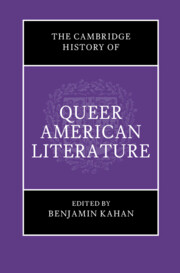Book contents
- The Cambridge History of Queer American Literature
- The Cambridge History of Queer American Literature
- Copyright page
- Contents
- Figures
- Tables
- Contributors
- Acknowledgments
- Introduction
- Part I Synchronic Histories of American Sexuality
- Part II Diachronic Histories of American Sexuality
- Queer Genre
- Race and the Politics of Queer and Trans Representation
- Space and the Regional Imaginary of Queer Literature
- 33 Queer Southern Literature and the Dirty South
- 34 Queer DiaspoRican Circuits
- 35 “where sadness makes sense”
- 36 Queer New England Regionalism
- 37 Queer Beginnings at the End of the Frontier
- 38 Queer American Literature in the World
- Part III Queer Methods
- Index
38 - Queer American Literature in the World
from Space and the Regional Imaginary of Queer Literature
Published online by Cambridge University Press: 17 May 2024
- The Cambridge History of Queer American Literature
- The Cambridge History of Queer American Literature
- Copyright page
- Contents
- Figures
- Tables
- Contributors
- Acknowledgments
- Introduction
- Part I Synchronic Histories of American Sexuality
- Part II Diachronic Histories of American Sexuality
- Queer Genre
- Race and the Politics of Queer and Trans Representation
- Space and the Regional Imaginary of Queer Literature
- 33 Queer Southern Literature and the Dirty South
- 34 Queer DiaspoRican Circuits
- 35 “where sadness makes sense”
- 36 Queer New England Regionalism
- 37 Queer Beginnings at the End of the Frontier
- 38 Queer American Literature in the World
- Part III Queer Methods
- Index
Summary
Is queerness coeval with American-ness, or with the American version of neoliberalism? The writers explored in this chapter, many of whom have close ties to countries other than the United States, are all preoccupied with these questions. Some, such as Tomasz Jedrowski and Garth Greenwell, implicitly accept queer identity as an American export. Others, including Chinelo Okparanta and Zeyn Joukhadar, fight to carve out small, temporary spaces of resistance to queerness’s entanglements with a certain brand of Western-ness. Others still, such as Shyam Selvadurai and Akwaeke Emezi, create interstitial queer identities that draw on non-Western understandings of selfhood and set them in conversation with mainstream Western queer culture. Focusing on the novel, this chapter engages with writers who identify as gay, lesbian, genderqueer, and trans/ogbanje, hailing from Nigeria, Sri Lanka, Taiwan, Germany/Poland, and Syria as well as the United States; while most of them are Anglophone, it also considers some examples of non-Anglophone representations of Western notions of queerness, such as Qiu Miaojin’s Notes of a Crocodile.
- Type
- Chapter
- Information
- The Cambridge History of Queer American Literature , pp. 685 - 702Publisher: Cambridge University PressPrint publication year: 2024

